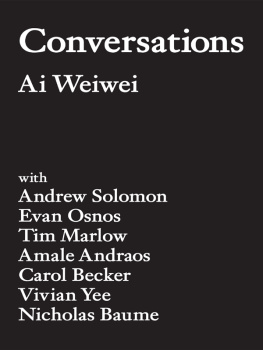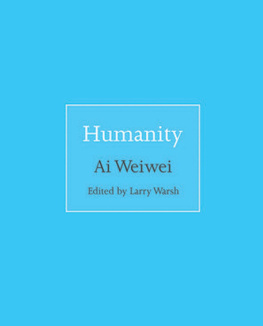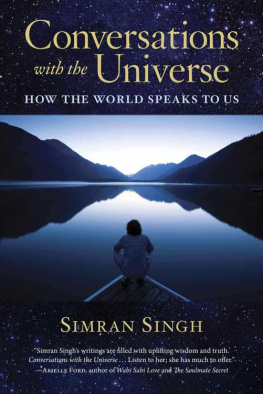Table of Contents
Conversations
Conversations
Ai Weiwei
Columbia University Press
New York
Columbia University Press
Publishers Since 1893
New York Chichester, West Sussex
cup.columbia.edu
Copyright 2021 Ai Weiwei
Chapter 1 copyright 2021 Andrew Solomon
All rights reserved
E-ISBN 978-0-231-55214-1
Library of Congress Cataloging-in-Publication Data
Names: Ai, Weiwei, author.
Title: Conversations / Ai Weiwei.
Other titles: Interviews. Selections. English
Description: New York : Columbia University Press, [2020]
Identifiers: LCCN 2019058902 (print) | LCCN 2019058903 (ebook) | ISBN 9780231197380 (cloth) | ISBN 9780231197397 (paperback) | ISBN 9780231552141 (ebook)
Subjects: LCSH: Ai, WeiweiInterviews. | Dissenters, ArtisticChinaInterviews.
Classification: LCC N7349.A5 A35 2020 (print) | LCC N7349.A5 (ebook) | DDC 700.92dc23
LC record available at https://lccn.loc.gov/2019058902
LC ebook record available at https://lccn.loc.gov/2019058903
A Columbia University Press E-book.
CUP would be pleased to hear about your reading experience with this e-book at .
Contents
In 2017, I presented Good Fences Make Good Neighbors with the Public Art Fund in New York City. This multisite exhibition included more than three hundred works distributed throughout the citys five boroughs. The works focused on the global refugee crisis, the greatest displacement of people since World War II. Filming my documentary, HumanFlow, brought me face to face with the people and places impacted by this tragedy and directly inspired the exhibition.
Good Fences was also a homecoming of sorts. I was an art student during the Beijing Spring in the late 1970s. The political and social atmosphere became increasingly suffocating, and I decided to leave for the extreme oppositeNew York City, the capital of individualism and capitalism. I lived in the city for a decade in the 1980s as an undocumented immigrant, college dropout, and artist. Back then, the opportunity to show my work to the public was unimaginable.
Conversations consists of six public discussions held in New York City during Good Fences. Such conversations involving academic, cultural, and journalistic institutions provided a platform to discuss the most crucial issues of our time: freedom of expression, human rights, and the idea that humanity is one. These conversations are necessary to continue the fight to maintain our shared values and freedoms.
Three years on, I am under self-quarantine due to the newest global phenomenon: an indiscriminate pandemic that knows no borders. At this time, it is more important than ever to be thoughtful and hopeful about our humanityhome or no home, crisis or no crisisbecause this is worth striving for.
Ai Weiwei
Alexandra Munroe Our speakers tonight hardly need an introduction. We know Weiwei as the worlds most famous artist and activist. He is also a curator of some of the most influential shows in the history of Chinese art; an architect of an entire art neighborhood in eastern Beijing; the first artist possibly anywhere in the world to see the internet as a space of free mobilization, as a forum for free expressionespecially in China, where such mobilization and constellation convening of a forum were unprecedented in modern Chinese history. When Evan Osnos asked him why he spent eight hours a day blogging and on Twitter, before the Chinese government shut down his blog in 2009, Weiwei responded, Its no different than making art. My stance in life is my art. Robert Bergold some years later asked him what advice he had for young artists; Weiwei responded, Forget about art. Fight for freedom.
Andrew Solomon is also someone who needs absolutely no introduction. His honors go on and on, but what they really recognize is Andrews influence and power as todays most transformational public intellectual. He is a writer and lecturer on politics, culture, and psychology as a professor of clinical psychology at Columbia University Medical Center and as the president of the beloved PEN America. Most important for us tonight, he is an activist on LGBT rights, mental health, and the arts. Andrews books, his essays, his TED talks, and his upcoming film Far from the Tree are connected by a deep humanity, a compassion so deep and so true that it can saveand actually has savedhundreds, if not thousands, of lives.
What Weiwei and Andrew share is a passionate belief in the rights and the dignity of each individual life. Whether you are a poet in jail somewhere in Xinjiang province or a manic-depressive in a psychiatric ward in Akron, Ohio, it is this alliance of mind and mission that brings the two together for this special PEN America evening. May I introduce Andrew Solomon and Ai Weiwei.
Andrew Solomon Well, the thing about being introduced by Alexandra Munroe is that one hardly need say anything further. Its a privilege and an honor for me to sit here with Ai Weiwei. As Alexandra mentioned, I wrote a piece for the New York Times Magazine. I went to China in 1992, persuaded that there must be interesting art happening there, but with no real access to what it was until I arrived.
Its hard now, in this age of internationalism, to remember a time when people here insisted that if what was being made outside of the so-called Western developed world looked like what was being made here, then it was derivative. If it looked different, then it was provincial. It took a great shift in consciousness for us to arrive at the international art world that seems so obvious to us today. When I was doing my research in China, Ai Weiwei was in New York, but everyone in China talked about him. I came home with his number, but I was too overwhelmed and didnt dial it. Its a real privilege, finally, to be sitting here with you. Thank you so much for doing this.
I think Ill begin by asking you to comment on the word dissident. I find, in having written a lot about art that falls outside of the so-called Western mainstream, that many artists resist the title of dissident. They say that it somehow trivializes the purity of their artistic expression. Others claim it as a banner. You have done more to work through what it means to be both a dissident and an artist, and indeed a dissident artist, than almost anyone else. Tell me how you feel about that word.
Ai Weiwei Dissident means very different things in different societies. I only can speak about what a dissident is in China, which is just having different opinions and different expressions. Expression can easily become very different if you dont self-censor, you dont recognize the totalitarians power, and you dont see that power having any legitimacy. If you think you have the right to vote or the right to write down your ideas or to put them on the internet, you become a dissident. It doesnt take too much effort.
Its very hard to imagine that, among 1.4 billion people, there are very few people who can be called dissidents. Its not that they are not smart or that they dont have different opinions, but theres no way to carry out an idea, to write down a clear sentence, to state your mind, or to talk to the public. In most times, this is not possible. Today, its even harder in China. The internet is a regional internet there, and still its dangerous to have any original thinking about social or political topics.







